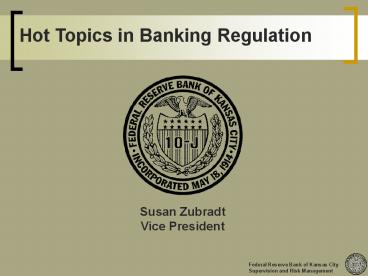Hot Topics in Banking Regulation - PowerPoint PPT Presentation
1 / 16
Title:
Hot Topics in Banking Regulation
Description:
Supervision and Risk Management. Revisions to Small BHC Policy Statement ... Constitute the highest priority supervisory matters ... Top IT Supervision Issues ... – PowerPoint PPT presentation
Number of Views:101
Avg rating:3.0/5.0
Title: Hot Topics in Banking Regulation
1
Hot Topics in Banking Regulation
Susan ZubradtVice President
2
Hot Topics
- Federal Reserve Regulatory Relief Efforts
- Call Report Updates
- Standardized Terminology
- Liquidity
- Top IT Supervision Issues
- Capital Adequacy Framework
3
Federal Reserve Regulatory Relief Efforts
- Federal Reserve System
- Size increase for Small BHC Policy Statement
- Support for portions of Congress reg relief
legislation - Allow institutions to pay interest on demand
deposits - Provide small bank examination flexibility
- Amend flood insurance requirements
- Repeal CRA sunshine requirements
- Reserve Bank
- Streamline examination processes
- Provide advisory visits
- Conduct outreach programs
4
Federal Reserve Regulatory Relief Efforts
5
Revisions to Small BHC Policy Statement
- Small BHC asset threshold increasing from 150
million to 500 million - Subordinated debt associated with Trust Preferred
Securities (TPS) to be considered debt, subject
to a transition period - TPS considered debt for determining down payment
requirements and ability to pay dividends - TPS not considered debt for determining
compliance with 12-year debt reduction and
25-year debt repayment requirements - Final Rule issued 2/27/06 Effective 3/30/06
Federal Reserve Bank of Kansas CitySupervision
and Risk Management
6
Revisions to Small BHC Policy Statement
7
Call Report UpdatesMarch 31, 2006
- Removed
- Customers liability to the bank on acceptances
outstanding RC-9 - Banks liability on acceptances executed and
outstanding RC-18 - Impact on income of derivatives held for purposes
other than trading RI-Memo 9 - Participations in acceptances conveyed to others
by the reporting bank RC-L5
8
Call Report UpdatesMarch 31, 2006
- Added
- Life insurance assets RC-F5
- Credit Derivatives Notional Amounts RC-L7
- Foreclosed properties from GNMA loans as a
subgroup of OREO RC-M3 - Credit Derivative Contracts RC-R Memo 2
- Changed
- Asset Backed Securities RC-B5 and RC-B Memo
9
Standardized Terminology
- Clear and consistent communication is critical.
To be effective, these communications should be - Written in clear, unambiguous language
- Prioritized and focused on significant matters
that require attention - Clear regarding what action must be taken
directly by the board vs. action for which the
board will be held accountable regardless of the
party to whom the board may delegate such action
10
Standardized Terminology
- What is our New Terminology?
- Categorizes matters requiring attention into
three groups - Required Actions
- Expected Actions
- Observations
11
Standardized Terminology
- Required Actions
- Constitute the highest priority supervisory
matters - Will specify the timeframe in which the action
must be completed, which is generally short, and
may be immediate - Board or management is required to respond in
writing regarding corrective action taken or
planned with corresponding timeframes
12
Standardized Terminology
- Expected Actions
- Constitute a lesser priority than Required
Actions, but nonetheless must be addressed over
time to prevent the emergence of a significant
issue - Board or management should provide a written
response regarding the plan for, progress and/or
achievement of the Expected Action
13
Standardized Terminology
- Observations
- Constitute examiner insights about sound industry
practices which could make the organization more
effective or efficient - No time frames required for response
- Board or management response not required
14
Liquidity and Bank Funding
15
Examination Liquidity Ratings
- Key Components Considered by Examiners
- Quantitative Factors
- Ratio Analysis (Liquidity, Asset Composition,
Noncore Funding) - Asset Liquidity (Unpledged liquid Assets, FFS)
- Dependence on Noncore Funding Sources (FHLB, FFP,
etc.) - Qualitative Factors
- Favorability of Funding Terms
- Source and Sustainability of Asset Growth
- Management Information and Reporting Mechanisms
- Corporate Governance/Risk Oversight
16
Top IT Supervision Issues
- During 2005, the Reserve Bank began assigning
and disclosing a composite URSIT rating for
serviced banks - Increased number of 3 rated IT functions
- Inadequate compliance with Information Security
Standards - Poor IT oversight and risk management practices
- Poor network management practices
- Poor business continuity planning
- Inadequate IT audit coverage
17
Capital Adequacy Framework
- Preliminary interagency proposal to revise
existing Basel standards - To bring current standards up-to-date
- Address potential competitive disadvantage from
Basel II - Major changes are possible
- More risk weight buckets
- Increase risk-sensitivity for selected asset
categories - 1-4 family residential loans
- Acquisition, development and construction loans
- Small business loans
- Loans past due 90 days or on nonaccrual
- Bankers are encouraged to monitor and comment on
formal proposal changes
18
Hot Topics in Banking Regulation
Questions
?































